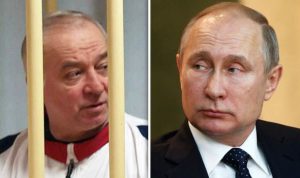The Skripal Affair: Cui Bono? Hysteria Before Multi-polarity

We bring to the attention of our readers this article by Ivalyo Grouev, Professor of Political Science, University of Ottawa. Dr. Ivaylo has carefully articulated what seems to be going on in this tangled mess in the Middle East.
The Skripal Affair followed by the missile strikes on Syria are too critical to be ignored. Both appear to be largely fabricated as a pretext for war.
The second Cold War has been launched along with the threat of a world war and the collapse of our civilization. Peace activists, especially the Doukhobors, need to speak up and be counted to oppose a world catastrophe. Much of the Western aggressive stance has to do with establishing hegemony for the United States and Great Britain, and much of it seems to be done under the banner of false flags, misinformation, and staged events (such as the White Helmets have done in Syria and which now is being used by the West as the only ‘evidence’ to declare that President Assad and President Putin are behind all of the world’s problems).
Koozma J. Tarasoff. April 16, 2018
***
“History is a set of lies agreed upon.” — Napoléon Bonaparte
On April 5rd, 2018 during the extraordinary session of the Security Council of the United Nations, Russia’s envoy to the UN Vassily Nebenzya described the Skripal affair as the “theater of absurd”. Days before, the official spokesperson of the Russian Ministry of Foreign Affairs Maria Zakharova called Theresa May’s speech a “circus act”. Known for his diplomatic tact, the number one diplomat in the Russian Federation Sergey Lavrov cited a quote from “Alice from the Wonderland” from the podium of the Moscow International Security Conference — it referenced the passage where the queen throws accusations and automatically sentences, without passing the threshold of any trivial due process. There is no question the UK prime minister Theresa May and Foreign Affairs minister Boris Johnston delivered a series of extraordinary performances in the best tradition of Monty Python, and surpassed the level of intense creative absurdity of their esteemed writers. (Indeed, Putin was compared to Hitler and FIFA 2018 to the 1936 Olympic games in Nazi Germany).
However, the impact was anything but entertaining. No laughing matter, by any stretch of imagination. To put it bluntly, it was terrifying. Rushing into the Parliament without presenting any evidence — Scotland Yard officially declared that it needs months to complete its investigation — UK Prime Minister Theresa May gave a twenty-four hour ultimatum to the Kremlin to admit its guilt. The reason? Without presenting any evidence or sample, Theresa May declared in Salisbury that a WMD [weapon of mass destruction] neuro gas (Novichok) was used against civilians, which had, she stated, a Russian origin. The logic of this accusation is akin to the claim that the perpetrator of the 2016 terrorist attack in Nice, France, where 86 people were killed, was the government of France, as the Renault truck used was made in France. Regardless, the Prime Minister failed to mention that the Porton Down chemical lab denied the fact that Novichok was produced in Russian Federation.
To give a twenty-four hour ultimatum to a nuclear power which may obliterate your state with but one of its new generation missiles is — to borrow a term from the psychiatric lexicon — a defiant act of melancholic suicide: when the perpetrator kills their partner, kids, relatives, pets and only then kills themselves.
What is most troubling is that the country which started the Magna Carta and gave birth to constitutional monarchy with institutional human rights has permitted itself to systematically ignore its domestic law, while displaying such blatant disregard for international law. The law was not the only fatality; basic human logic and intelligence has been victimized, making the Skripal affair even more disturbing. Indeed, the perplexing contradictions in the official narrative can truly make one question the mental health of those issuing the official accusations. Indeed, the numerous inconsistencies of the Skripal affair are offensive to basic logic. How is it that the most powerful neuroparalytic WMD gas — supposedly used in this attack — failed to kill anyone in contact, not only Skripal but also the emergency doctor who was treating them at the scene for over half an hour? The only fatalities of this event were in fact two Guinea pigs and a cat, in Skripal’s sealed home, who died from dehydration, not from the gas.
The story had multiple incredible twists; the two comatose bodies are now in good health. Julia Skripal managed to have phone conversation with her aunt, then the neuro-paralytical WMD gas turned out to be a cream placed on the front door handle, which then became instead contaminated porridge brought from Russia. Even the best of Monty Python could not reach such a staggering height of absurdity.
However, the hard question cui bono? [who benefits] from the Skripal case remains open.
A few possible explanations come to mind:
- A mega public relations campaign to distract the British electorate from the rather raucous Brexit divorce, while Britain may be on the hook to pay billions of dollars to the EU.
- The “Falklands Factor“: an attempt to consolidate its failing popularity among the British electorate as well as within the ranks of the Conservative party. This could signal the repetition of the successful political stunt in 1983, where then Prime Minister Thatcher faced an imminent defeat and subsequently engaged a military campaign against Argentina for the tiny Falkland Islands (and its population of less than three thousand). This victory saved her government in the next elections.
- A smear campaign to besmirch the Opposition Labor Party, which was dramatically gaining strength before the Skripal affair, and blaming Jeremy Corbyn for his soft stand on Russia in declaring him to be a “Putin useful idiot” (as stated by Boris Johnston).
- Planting a poisonous pill before leaving the EU, thus making it increasingly difficult for EU member states with struggling economies to manage the astounding $ 80 billion dollars deficit as result of the anti-Russian sanction.
- To silence the less vasal-minded Slovakia, Czech Republic, Austria and most recently Italy, who openly expressed the will to distance themselves from the Washington dictate and drop the anti-Russian sanctions.
- To revoke the licenses of the Russian state-owned “Russia Today” and “Sputnik International”, seen as unacceptable media outlets that challenge the mainstream narrative in the West.
- To further strengthen the climate of intimidation and self-imposed censorship in the mainstream media in the West, thus making it impossible to view any positive coverage on Russia and Russian politics.
- Targeting the Nord Stream 2 Pipeline, as dismantling the project has continuously been a focal political objective especially after 2014, when Russian businesses were cut out of European banks to stop contractor and creditor payments associated with the pipeline.
- To create an “October surprise”, an American term as US elections are held in November — the media mania that ensued the Skripal affair would be useful in swaying the outcome of Russia’s presidential elections on March 18. This is a rather opportune time to cause an international scandal, as three powerful buzzwords are strung together: Putin, KGB, poisoned ex-KGB spy.
- To upset the World Cup in Russia in 2018, where some heads of states, such as the British royal family, may no longer be in attendance, making this event even less legitimate on the international scene.
- To confiscate the “illegally obtained money” of Russians living in the West beyond Deripaska and Karimov. The city of London is the hub of the Russian nouveau riche and oligarchs; according to some reports, there are more than twenty thousand Russians from these categories living in London. Two objectives would therefore be focalized: the creation of enormous pressure within the Putin administration, and offsetting the financial black hole as result of Brexit.
All these factors seem plausible in the decision-making process which led to the most unprecedented and coordinated expulsion of Russian diplomats — more than two hundred Russian diplomats — from EU, from the USA, Canada, Australia as well as from two of the most important international organizations, the United Nations and NATO. However, as powerful as these factors may be, they cannot explain the level of the current geo-political hysteria.
The Skripal affair is a powerful tool in order to demolish any possible rapprochement between the White House and the Kremlin. This would render any of Trump’s future attempts to engage in dialogue with Russia nothing other than an impeachable offence — ie, sealing his political coffin from the inside.
In this case, the architects of the Skripal affair hoped to achieve multiple objectives. First, the elimination of the Trump factor — the scandal has made the flamboyant maverick president compliant and under control of the deep state, attenuating any risk of brisk unauthorized moves. Secondly, the Skripal scandal may make it possible to exercise even greater pressure on EU member states in controlling the European – Russian division just like the old Berlin Wall. Finally, and this remains the most important point, the Skripal affair may pave the way to a full-scale Cold War, where no political leader — be it from the right, left or center — is able to pose obstacle.
The Skripal saga can plausibly be understood as a de facto declaration of a New Cold War. It is interesting that Britain — and not the USA — was in charge of the heavy PR lifting. We should not forget the simple fact that it was a different prime minister, Winston Churchill, who in 1946 delivered the famous “Iron Curtain” speech in Fulton, Ohio, the first official declaration of the Cold War.
The strategy of the Cold War had been developed by a young American diplomat, George Kennan, though no one has ever heard of this low-rank diplomatic attaché. Instead, everyone knew the name of one of the “Big Three” from Yalta — Winston Churchill. Churchill did the PR for the Americans. This is how you become the strongest ally to the new Pax Americana. That was back in 1946, and in 2018 the same scenario was repeated. This has nothing original to it. In 2018, the British Prime minister has played the same role: to deliver an important message that any attempt to challenge the unquestionable hegemony of the USA in this unipolar world will be met with stern response, even if it leads to a total disregard of international law. However, we ought to remember that this is exactly how WWII began. Disrespect for international law, political impotence, and “solidarity” with Hitler policies by many member states of the League of Nations.
In hindsight, there was an importance difference back in 1946. The Cold War had its unwritten but respected rules, which explains how we survived 47 years of this period. I am afraid that in this New Cold War, we do not have these same guarantees. As such, we cannot expect this impending conflict to carry the adjective ‘Cold’ either.
*
This article was first published on the blogsite of Koozma J. Tarasoff
Prof. Ivaylo Grouev is a professor of Political Science at the University of Ottawa, Canada and a frequent contributor to Global Research


